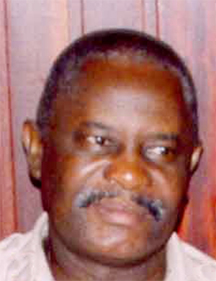Former police commissioner Winston Felix said yesterday that during his tenure the government deliberately withheld the resources needed to enhance the Guyana Police Force.
“It was the question of the provision of resources and I can say clearly that at that time I felt that I was deliberately starved of resources…. It was a perception issue. They had a perception of me,” Felix, a candidate for the opposition coalition A Partnership for National Unity (APNU) told a news conference, in response to a question about his difficulties were working under the current government.
Felix said if the force’s image is to be improved and crime is to be tackled effectively, salaries, manpower and crime fighting tools need to be urgently addressed as they are critical for overall reform.

At his first press conference for APNU, Felix said the first step to police reform is the force having the respect of the public that it serves. “That is the first and necessary prerequisite for reforming the force. The force must understand that they serve a public and they must do so efficiently,” he said.
According to him, common issues affecting the force’s efficiency are the shortage of manpower and the lack of resources. “What I do know is that the Symonds Commission of Inquiry report, other commissions and the number of crime commissions, which came into operation since 1992, ought to have provided adequate measures which any government can use to improve the police force and thereby contribute to enhanced security for the public,” he added.
Making specific reference to buildings and accommodation, Felix said that during his tenure—2004 to 2006—the capital budget was taken to the Ministry of Home Affairs. “Whatever was forthcoming from that was left to their discretion. So, when I could have responded to repairing the Leonora Police Station, from the capital budget, I could not have done so unless the Ministry of Home Affairs dealt with it,” he said.
He noted that the issue of the interior policing was another shortcoming. He explained that he had developed a patrol system in the interior designed to interdict illegal miners but this initiative was hampered by inadequate manpower, which did not allow for the deployment of ranks in several areas at one time.
Inadequate salaries, he noted, is another problem that affected recruitment. He recalled that a salary review was done by labour strike arbitrator Aubrey Armstrong and payments were to be made to the police and members of the public service in two parts. To date, only one part was paid out, he said.
He added that conditions like salaries needed to be improved so that skilled persons would join the force, which needs to attract people of talent, with good secondary education backgrounds and who could respond to issues intelligently.
“You wouldn’t get that quality by paying peanuts,” he argued.
Felix was unwilling to ascribe a motive to the government for not seriously investigating crimes, such as recent massacres.
“I don’t want to talk about that but what you can look at were the indicators after. Because if a serious crime was committed like a massacre—Lusignan—shouldn’t there have been an inquiry into that? A national inquiry? You have Bartica. Shouldn’t there have been an inquiry? You have Lindo Creek. Shouldn’t there have been an inquiry?” he said, noting that the purpose of an inquiry is to acquire information which would have allowed the public to know what took place, those who were to be held accountable and what steps could be taken in future to prevent the incident from recurring.
He added that an inquiry would also provide the organisation with necessary information for improvement of the particular disciplined service – whether it is the police or the prison service. “But if you don’t hold an inquiry you go back to doing the same thing,” he added.
Interior security
Meanwhile, APNU presidential candidate David Granger said that Guyana is now in an era of transnational crime and much more emphasis needs to be placed on securing its borders and equipping police with aircraft and boats.
He noted that some of the crimes in Guyana are the consequence of poor border controls and the crimes, like narco trafficking, have their origins in other countries. “But by failing to give the police force their assets which they need to secure our borders—for example, the Brazil border alone is over 1,100 kilometres long—the force cannot do that on foot they need air craft,” he said.
Granger added that every month there is a report of piracy off the coast of Guyana. “The police need maritime craft in order to effect patrols to protect our fishermen. So, in addition to the manpower problem, we need to give the police the assets to enable them to do their job properly,” he noted.
With the police force nearly 20% undermanned, Granger accused the Ministry of Home Affairs of failing to address the situation and instead resorting to creating neighbourhood and community policing groups. He said that these two arms might be necessary but they must supplement the regular police force. The E&F Division that includes interior locations, he noted, is vast and because of insufficient manpower and assets, banditry is on the rise.
“Police just do not have the strength or assets to control such a wide area and those areas are more susceptible to international criminal activity, particularly from Venezuela and Suriname,” he said.





